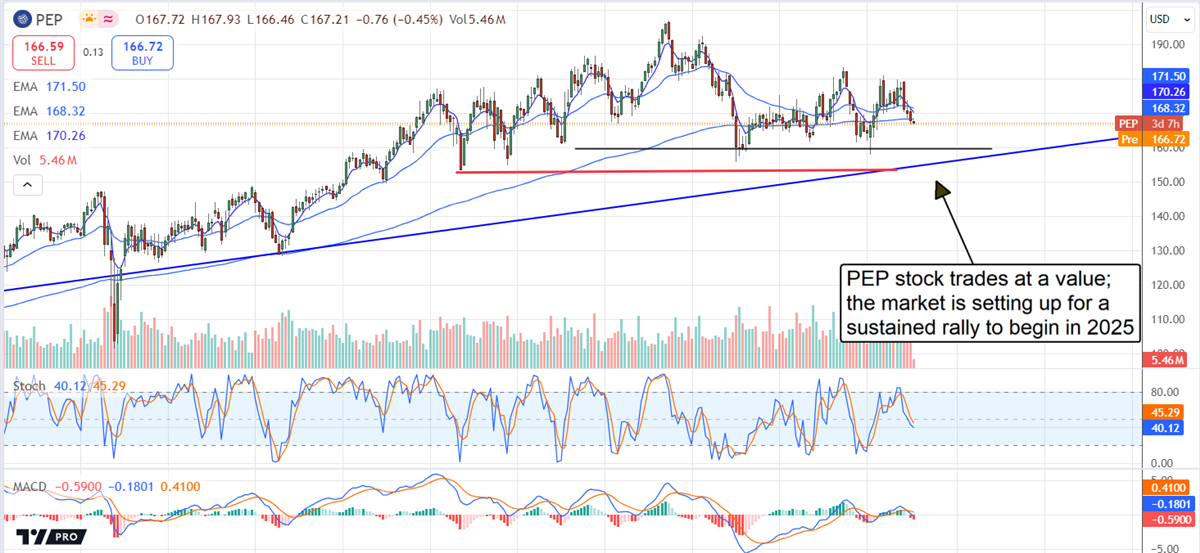Investors looking to enter PepsiCo PEP stock or build on existing positions should rejoice. The FQ3 2024 earnings report was weaker than expected, causing the stock price to dip. While weaker-than-expected results and a soft outlook for revenue aren't news to be happy about, the tally isn't as bad as headlines make it seem, and there is the long-term outlook to consider.
PepsiCo is the world's largest consumer staples company, impacted by internal and external one-offs that will soon pass. Until then, it is a solid, reliable dividend payer of Dividend King quality and will weather the current downturn in activity as it has done in the past, which is very well.
The critical details for investors to focus on today are the valuation and dividend yield. The stock, down from highs set in 2023, trades at roughly 20.5x its earnings outlook at the low end of the historical range. Likewise, the dividend distribution, which is expected to continue growing, yields about 3.25%, with shares near critical support levels and at the high end of the historical range. Investors that buy in at the current levels have limited risk and potential for a 50% share price increase at the high-end valuation range. There can be no better time to enter a blue chip stock such as this regarding long-term investing, portfolio maximization, total returns, and dollar-cost averaging.
PepsiCo's Soft Q3 Is No Concern for Long-Term Investors
PepsiCo had a softer-than-expected Q3, but each negative was offset by a positive, leaving shareholder value improved and the long-term outlook unchanged. The $23.32 billion in net revenue is down -0.6% compared to last year and missed the consensus by 200 bps, but organic growth is present, and the margin is good. Organically, core operations are up 1.3%.
Segmentally, Quaker North America was the weakest, with a contraction of 13%. However, the weakness is primarily due to the recalls in Q1 and the subsequent shuttering of a plant believed to be the source of contamination. Weakness was also seen in Frito Lay North America, but the 1% contraction is less of a concern and offset by organic growth in PepsiCo North America, Latin America, and Europe. Asia-Pacific (APAC) is the weakest regionally, with a contraction of -1%, impacted by rising geopolitical tensions.
PepsiCo experienced margin contraction in Q3, but aggressive cost controls and increased efficiencies produced a better-than-expected result. The takeaway is that adjusted earnings grew compared to last year and outpaced the consensus target and organic revenue growth. Because cost controls and investment in operational efficiencies are part of the equation, investors can expect a leverage rebound in earnings when top-line growth resumes, likely to be sometime in F2025.
Guidance is also mixed, with the revenue target reduced but organic EPS growth targets reaffirmed. The salient detail is that operational improvements are expected to stick, providing sufficient cash flow to sustain the fortress balance sheet while returning capital to investors and investing in the business. Regarding the balance sheet, the company produced positive cash flow operationally but negative cash flow for the business. However, that detail is offset by the timing of debt issuance and repayment, increased assets, decreased liability, and a 5% improvement in shareholder equity.
PepsiCo Capital Returns Help Support the Price Action over Time
PepsiCo's capital return is reliably safe and growing. The company's dividend distribution is up 7% per share compared to 2023, aided by repurchases. The repurchase activity is up incrementally compared to last year, and the count was reduced by 0.35% for the quarter and YTD periods. Investors may expect to see distribution increases slow in 2025 but not cease; share repurchases are also likely to continue at the current pace.
The price action in PepsiCo stock was tepid following the release, leaving the stock price down in early trading. However, the market is trading near a floor at $160, where support has been strong and is likely to produce a rebound. The $160 floor coincides with a significant uptrend line in 2024, so the rebound could be strong and result in a sustained uptrend in 2024.
Among the catalysts for 2025 are a return to top-line growth, leveraged results on the bottom line, and the possibility that growth will exceed the current forecasts because of the addition of Siete Foods. Siete Foods is a Mexican-American food brand growing above the industry's 4% CAGR, providing inroads into a new product vertical worth billions in annual revenue while complementing PepsiCo's better-for-you food offerings.

The article "This Is the Entry Into PepsiCo You've Been Waiting For" first appeared on MarketBeat.
Edge Rankings
Price Trend
© 2025 Benzinga.com. Benzinga does not provide investment advice. All rights reserved.
Trade confidently with insights and alerts from analyst ratings, free reports and breaking news that affects the stocks you care about.